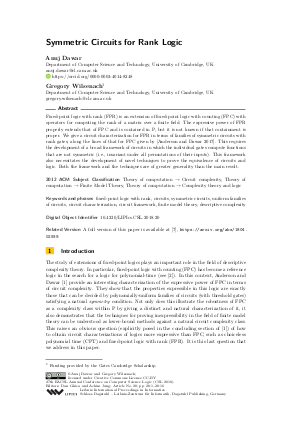Symmetric Circuits for Rank Logic
Authors
Anuj Dawar  ,
Gregory Wilsenach
,
Gregory Wilsenach
-
Part of:
Volume:
27th EACSL Annual Conference on Computer Science Logic (CSL 2018)
Part of: Series: Leibniz International Proceedings in Informatics (LIPIcs)
Part of: Conference: Computer Science Logic (CSL) - License:
 Creative Commons Attribution 3.0 Unported license
Creative Commons Attribution 3.0 Unported license
- Publication Date: 2018-08-29
File

PDF
LIPIcs.CSL.2018.20.pdf
- Filesize: 0.53 MB
- 16 pages
Document Identifiers
Related Versions
Subject Classification
ACM Subject Classification
- Theory of computation → Circuit complexity
- Theory of computation → Finite Model Theory
- Theory of computation → Complexity theory and logic
Keywords
- fixed-point logic with rank
- circuits
- symmetric circuits
- uniform families of circuits
- circuit characterization
- circuit framework
- finite model theory
- descriptive complexity
Metrics
- Access Statistics
-
Total Accesses (updated on a weekly basis)
0Document
0Metadata
Abstract
Fixed-point logic with rank (FPR) is an extension of fixed-point logic with counting (FPC) with operators for computing the rank of a matrix over a finite field. The expressive power of FPR properly extends that of FPC and is contained in P, but it is not known if that containment is proper. We give a circuit characterization for FPR in terms of families of symmetric circuits with rank gates, along the lines of that for FPC given by [Anderson and Dawar 2017]. This requires the development of a broad framework of circuits in which the individual gates compute functions that are not symmetric (i.e., invariant under all permutations of their inputs). This framework also necessitates the development of novel techniques to prove the equivalence of circuits and logic. Both the framework and the techniques are of greater generality than the main result.
Cite As Get BibTex
Anuj Dawar and Gregory Wilsenach. Symmetric Circuits for Rank Logic. In 27th EACSL Annual Conference on Computer Science Logic (CSL 2018). Leibniz International Proceedings in Informatics (LIPIcs), Volume 119, pp. 20:1-20:16, Schloss Dagstuhl – Leibniz-Zentrum für Informatik (2018)
https://doi.org/10.4230/LIPIcs.CSL.2018.20
BibTex
@InProceedings{dawar_et_al:LIPIcs.CSL.2018.20,
author = {Dawar, Anuj and Wilsenach, Gregory},
title = {{Symmetric Circuits for Rank Logic}},
booktitle = {27th EACSL Annual Conference on Computer Science Logic (CSL 2018)},
pages = {20:1--20:16},
series = {Leibniz International Proceedings in Informatics (LIPIcs)},
ISBN = {978-3-95977-088-0},
ISSN = {1868-8969},
year = {2018},
volume = {119},
editor = {Ghica, Dan R. and Jung, Achim},
publisher = {Schloss Dagstuhl -- Leibniz-Zentrum f{\"u}r Informatik},
address = {Dagstuhl, Germany},
URL = {https://drops.dagstuhl.de/entities/document/10.4230/LIPIcs.CSL.2018.20},
URN = {urn:nbn:de:0030-drops-96870},
doi = {10.4230/LIPIcs.CSL.2018.20},
annote = {Keywords: fixed-point logic with rank, circuits, symmetric circuits, uniform families of circuits, circuit characterization, circuit framework, finite model theory, descriptive complexity}
}
Author Details
Funding
- Wilsenach, Gregory: Funding provided by the Gates Cambridge Scholarship.
References
-
M. Anderson and A. Dawar. On symmetric circuits and fixed-point logics. Theory of Computing Systems, 60(3):521-551, 2017.

-
A. Dawar. The nature and power of fixed-point logic with counting. ACM SIGLOG News, 2(1):8-21, 2015.

-
A. Dawar. On symmetric and choiceless computation. In Mohammad Taghi Hajiaghayi and Mohammad Reza Mousavi, editors, Topics in Theoretical Computer Science, pages 23-29, Cham, 2016. Springer International Publishing.

-
A. Dawar, E. Grädel, B. Holm, E. Kopczynski, and W. Pakusa. Definability of linear equation systems over groups and rings. Logical Methods in Computer Science, 9(4), 2013.

-
A. Dawar, M. Grohe, B. Holm, and B. Laubner. Logics with rank operators. In 2009 24th Annual IEEE Symposium on Logic In Computer Science (LICS), pages 113-122, 2009.

-
A. Dawar and B. Holm. Pebble games with algebraic rules. In Artur Czumaj, Kurt Mehlhorn, Andrew Pitts, and Roger Wattenhofer, editors, Automata, Languages, and Programming, pages 251-262, Berlin, Heidelberg, 2012. Springer Berlin Heidelberg.

- A. Dawar and G. Wilsenach. Symmetric circuits for rank logic. arXiv, 2018. URL: http://arxiv.org/abs/1804.02939.
-
L. Denenberg, Y. Gurevich, and S. Shelah. Definability by constant-depth polynomial-size circuits. Information and Control, 70(2):216-240, 1986.

-
E. Grädel and W. Pakusa. Rank logic is dead, long live rank logic! In 2015 24th Annual Conference on Computer Science Logic, (CSL), pages 390-404, 2015.

- M. Grohe. Descriptive Complexity, Canonisation, and Definable Graph Structure Theory. Lecture Notes in Logic. Cambridge University Press, 2017. URL: https://books.google.co.uk/books?id=RLYrDwAAQBAJ.
-
L. Hella. Logical hierarchies in ptime. Information and Computation, 129(1):1-19, 1996.

-
N. Immerman. Relational queries computable in polynomial time. Information and Control, 68(1-3):86-104, 1986.

-
N. Immerman. Descriptive Complexity. Graduate texts in computer science. Springer New York, 1999.

-
L. Libkin. Elements of Finite Model Theory. Texts in Theoretical Computer Science. An EATCS Series. Springer Berlin Heidelberg, 2004.

-
M. Otto. The logic of explicitly presentation-invariant circuits. In 1996 10th International Workshop, Annual Conference on Computer Science Logic (CSL), pages 369-384. Springer, Berlin, Heidelberg, 1997.

-
M. Vardi. The complexity of relational query languages (extended abstract). In Proceedings of the Fourteenth Annual ACM Symposium on Theory of Computing, pages 137-146, New York, NY, USA, 1982. ACM.

